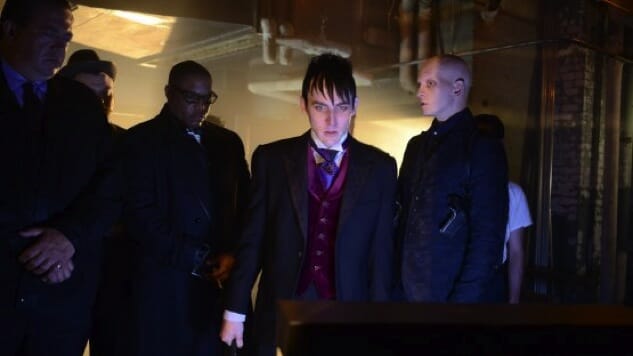Gotham: “Mommy’s Little Monster”
(Episode 2.07)

After seven weeks, it’s difficult to say whether Gotham’s serialized storytelling has made a significant difference in quality. It’s cleaned up episode construction, but the writers aren’t taking full advantage of the cleaner real estate. It’s given the show a slow burn quality, but Gotham thrives best with rapid bursts of flame. The show is stuck in limbo, the dichotomy between what it could be and what it is growing larger with each passing week. In many ways, “My Little Monster” is the perfect illustration of the show’s current state: brimming with potential but failed by the little things.
Nearly a quarter into last night’s episode, I was ready to write it off. Beyond perturbed, I believed the season’s seventh episode was following a similar path to that of “Strike Force,” the dismal fourth entry that remains the year’s low point. Then the second half rolls in, and “My Little Monster” turns into the closest thing Gotham has ever had to an action-packed thrill ride. It’s not quite that, because the show still can’t get its action to the level of contemporaries like Arrow or Agents of S.H.I.E.L.D., but it’s entertaining. A payoff episode in the new serialization format, “My Little Monster” does a decent job of delivering something more substantial than weeks previous, while also keeping intrigue for the hours to come. Still, the writing is so poor that I never found a rhythm in the episode, feeling unnerved throughout. There are moments of unintentional cheese and cringe-worthy dialogue in all these comic book shows, but nothing comes close to this Fox drama. Every scene contains a line in need of editing. There’s one, in particular, between Bruce, Selina and Silver St. Cloud (the scheming love-interest for Bruce introduced a few weeks ago) that reads like something from Degrassi, or a well-funded after school special. Some of that is alleviated by a few enjoyable firefights and a well-crafted final set piece, but with the vast improvements Gotham has made in terms of episode construction, it is frustrating to watch the show continue to disappoint because it can’t string along an hour of proper dialogue.
-

-

-

-

-

-

-

-

-

-

-

-

-

-

-

-

-

-

-

-

-

-

-

-

-

-

-

-

-

-

-

-

-

-

-

-

-

-

-

-








































